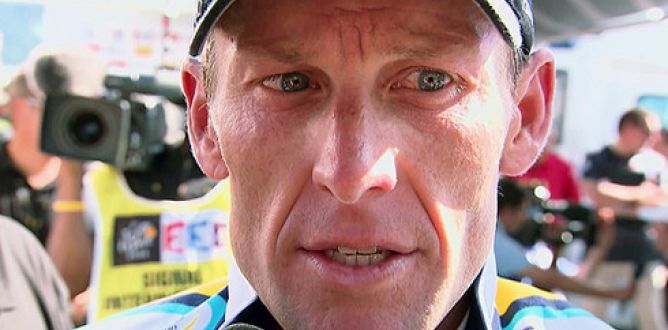The Armstrong Lie Parent Guide
A would-be celebration becomes a doping scandal tell-all
Parent Movie Review
“The bigger they are, the harder they fall,” might be the perfect idiom to describe The Armstrong Lie. In anticipation of Lance Armstrong’s return to cycling after his 2005 retirement, Director Alex Gibney began shooting footage for a film. The world-class cyclist already had seven Tour de France titles, yet wanted the chance to prove he could do it again.
Allegations about doping had been swirling around Armstrong for years. However, authorities in the sport failed to produce the proof they needed to convict him. In the meantime Lance, who was diagnosed with testicular cancer in 1996, had established the Lance Armstrong Foundation. After successfully recovering from his own near-death dance with the disease, he became a spokesman and advocate for other cancer patients. The Livestrong foundation raised over $500 million to fight this illness. The yellow silicone Livestrong wristbands, developed by Nike, sold like hotcakes.
His return to the sport he loved seemed like the perfect plot for a film. But unlike screenwriters who control their narratives, documentarians can’t always predict where their stories will go. Such was the case for Gibney. In 2012, the doping allegations resurfaced with fervor. Then in January 2013, Armstrong publically admitted to doping in an exclusive interview with Oprah Winfrey and all bets about the suspected drug use were off. Gibney, afraid the hours of footage would have to be scrapped, put his project on hold.
Then, rather than dump all his work, Gibney decided to revisit the footage from the perspective of what he called in a Screen Daily interview, “his own role as part of the myth-making apparatus.” The final cut of The Armstrong Lie is narrated by Gibney and includes interviews from Armstrong’s former teammates, the doctor involved in the doping and others associated with the biking legend.
Armstrong has moments of contrition in this documentary. Still, after seeing how vehemently he denied his drug use for so many years, it is hard to know how sincere his remorse really is. Armstrong appears to have used his power and prestige to squash any opponents, including former teammates, who testified against him. His actions disappointed or damaged not only the sport of biking and Tour de France, but also a lengthy list of sponsors, cancer victims and the film crew. And while there seems to be a hint of justification for doping in a sport that was rife with drug use, the biggest hurdle for most people seems to be Armstrong’s lies—untruths that he staunchly defended.
The danger of winning at any cost is one worth discussing, especially with young athletes who’s only ambition is to make it to the top of the podium. (Unfortunately for teen viewers and their parents, this R-rated film includes about a dozen uses of a sexual expletive and a smattering of other profanities.) By the end of the documentary, the question remains for the viewer: Is Lance sorry for what he did, or just sorry he got caught?
Directed by Alex Gibney. Starring Lance Armstrong, Reed Albergotti, Betsy Andreu. Running time: 124 minutes. Theatrical release November 8, 2013. Updated July 17, 2017
The Armstrong Lie
Rating & Content Info
Why is The Armstrong Lie rated R? The Armstrong Lie is rated R by the MPAA for language.
Violence: A man repeatedly lies and uses his power to hurt his opponents. A minor scuffle occurs with doping officials.
Sexual Content: A man’s bare buttocks are briefly scene.
Language: The script contains about a dozen strong sexual expletives, other profanities and some name-calling.
Alcohol / Drug Use: This film deals with doping in sports. Medical personnel and athletes discuss how they used drugs, but very little actual drug use is shown. A character receives a blood transfusion to up the oxygen levels in his blood.
Page last updated July 17, 2017
The Armstrong Lie Parents' Guide
Why is winning so important to Armstrong? How does he use his successes on the bike tour to define himself? Do you think this admission of guilt will significantly change the way he approaches life in the future or not?
How were others hurt by Armstrong’s untruths? Who lost jobs or opportunities?
Will cycling (as well as other sports) ever be able to remove doping? Does more sophisticated testing just mean the ways to avoid detection also will become more sophisticated? Could a “clean” athlete ever successfully compete?
Home Video
The most recent home video release of The Armstrong Lie movie is February 11, 2014. Here are some details…
Home Video Notes: The Armstrong Lie
Release Date: 11 February 2014
The Armstrong Liereleases to home video (Blu-ray and DVD) with the following extras:
- Commentary with the Academy Award® winning Director Alex Gibney
- Q&A with Alex Gibney, Frank Marshall, Bill Strickland, Jonathan Vaughters & Betsy Andreu
- Deleted Scenes
Related home video titles:
The challenges faced another cyclist trying to compete on a world level are depicted in The Flying Scotsman. An Olympian, who stayed true to his principles even if it meant he would not be able to participate in his sport, is portrayed in Chariots Of Fire.

